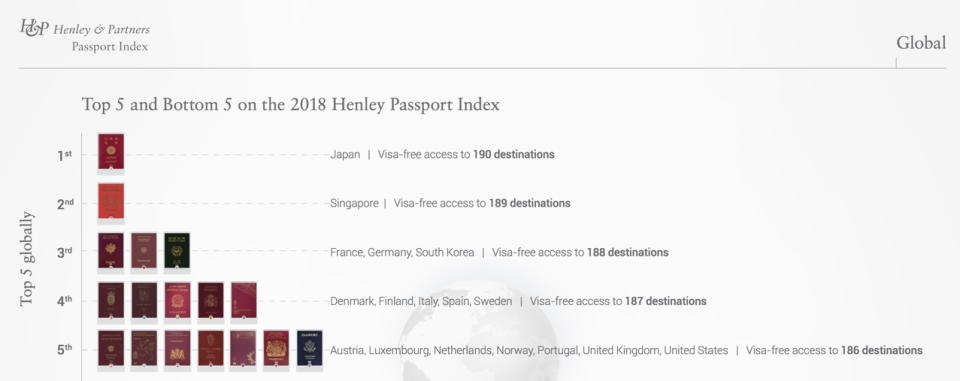Canadian, U.S. passports are not the most powerful in the world
A Canadian passport is like a key to thousands of cities.
The travel document ranks sixth (tied with Belgium, Switzerland and Ireland) in the Henley & Partners Passport Index, a global ranking based on the number of countries to which a passport grants visa-free access.
Now that Japanese passport holders can visit Myanmar without a visa, the country has moved to the top spot on the index, which released its fourth quarter report on Oct. 9.
Top Ten
1st: Japan (190 countries)
2nd: Singapore (189)
3rd: Germany (188), France (188), South Korea (188)
4th: Denmark (187), Finland (187), Italy (187), Sweden (187), Spain (187)
5th: Norway (186), United Kingdom (186), Austria (186), Luxembourg (186), Netherlands (186), Portugal (186), United States (186)
6th: Belgium (185), Switzerland (185), Ireland (185), Canada (185)
7th: Australia (183), Greece (183), Malta (183)
8th: New Zealand (182), Czech Republic (182)
9th: Iceland (181)
10th: Hungary (180), Slovenia (180), Malaysia (180)
For the full list click here
Why would a country strive to make its passport so versatile?
“Tourism, tourism, and perhaps a little bit of diplomatic goodwill,” says Willem Maas, a professor of political science at Toronto’s York University.
Maas, who co-edits the Politics of Citizenship and Migration book series and has written about citizenship and migration, called the differences between top-ranked Japan and Canada “minor.”

“The difference is that Japanese citizens can travel visa-free to Azerbaijan, China, India, Iran, Myanmar, Uzbekistan, and Vietnam while Canadians need a visa to visit these countries. But on the other hand Canadians can travel visa-free to Gambia and Burkina Faso while Japanese citizens need a visa,” he wrote.
He called the sixth-place ranking deceptive since so many countries have similar scores. The list includes 199 passports ranked by access to 227 possible travel jurisdictions. Fifty-two of those passports enjoy “relatively easy” travel, he said, with 158 visa-free jurisdictions available.
Pay attention to world’s least powerful passports
Bottom Ten
97th: Kosovo (44)
98th: Congo (Dem. Rep.) (43), Iran (43)
99th: Sri Lanka (42), Ethiopia (42), North Korea (42)
100th: South Sudan (41), Bangladesh (41), Lebanon (41), Libya (41)
101st: Nepal (40)
102nd: Sudan (39), Eritrea (39), Palestinian Territory (39)
103rd: Yemen (37)
104th: Pakistan (33)
105th: Somalia (32), Syria (32)
106th: Iraq (30), Afghanistan (30)
What is of interest, he said, is the countries ranked at the bottom of the list, such as Iraq and Afghanistan.
“The reason is fairly obvious: destination countries that require a visa are worried about people from these countries coming and applying for asylum,” he said.
“That’s why Canada used to require a visa for citizens of the Czech Republic or Mexico, for example; and those countries reciprocated by requiring Canadians to have a visa to visit them.”
But don’t look to the index to get a pulse on geopolitical relations, Maas said.
What the index does suggest is that travel is becoming relatively easier as countries relax their visa requirements, he said.
“In 2006, citizens of the ‘top’ countries (Denmark, Finland, and the United States) could visit 130 jurisdictions without a visa (Canadians could visit 125); today citizens of the top countries can visit far more (Canadians can visit 185 jurisdictions without a visa),” he wrote in an email.
He pointed out the same trend is true of the countries on the bottom of the list: in 2006, citizens of bottom-ranked Afghanistan could visit only 12 jurisdictions without a visa while today they can visit 30.
The key word in all this is visit, he said.
“This index is more about travel than migration: the fact that you don’t need a visa in order to visit somewhere as a tourist doesn’t mean you can immigrate there more permanently.”

